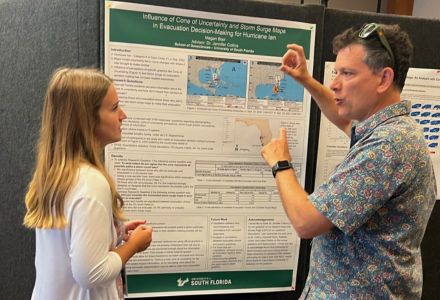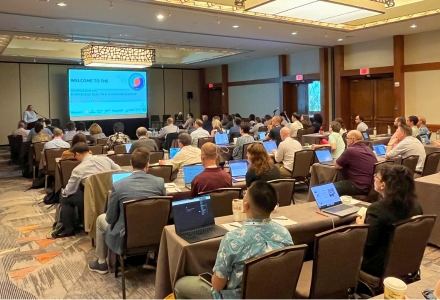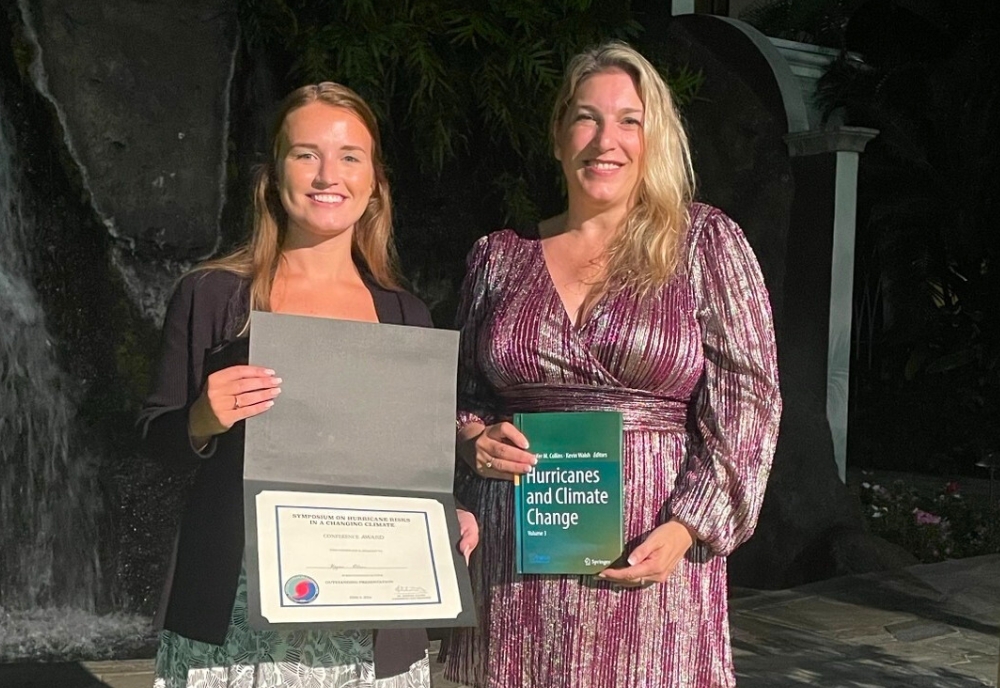Megan Blair, a graduate student at the USF College of Arts and Sciences, has been acknowledged for her research on communication regarding Hurricane Ian, the public’s perception of the associated risks, and ultimate evacuation decisions.

Blair (left) presenting her poster to Dr. Gabriel Vecchi, hurricane researcher from Princeton University, during the symposium. (Photo courtesy of Jennifer Collins)
Blair’s research, “Influence of the Cone of Uncertainty and Storm Surge Maps in Hurricane Ian Evacuation Decision Making,” was awarded the Application Novelty award at the Hurricane Risk in a Changing Climate Symposium held in Honolulu, Hawaii in early June.
The symposium drew participants from around the globe, including meteorologists, social scientists, engineers, and academic researchers for a multi-day event focused on in-depth discussions on hurricane risk.
American Association of Geographers member Dr. Jennifer Collins, professor in the School of Geosciences, was the lead organizer of the symposium, which is now in its eighth year.
Blair, a rising second-year master’s student majoring in geography, was one of three students recognized by a panel of judges—selected from the private industry and academia with no ties to the students. Funding for the awards was provided by industry sponsors Gallagher Re, Renaissance Re, FM Global, Moody’s, and Reask.
Other student award recipients included students from North Carolina State University and Shanghai Jiao Tong University.
In her research, Blair found that of those who stayed home during Hurricane Ian, a significant portion had misunderstandings about what the cone of uncertainty graphic was showing them.
“Out of those who stayed home, an overwhelming majority claim to have used storm surge maps in their decision-making process, yet they didn’t evacuate,” Blair explained. “These findings suggest that residents may not properly understand their risk based on the official graphics that are provided, revealing a critical need for graphic improvement that would better educate and persuade evacuation to those who are in a potentially life-threatening situation.”

The symposium was held June 2-6, 2024 in Honolulu, Hawaii and drew 75 attendees from around the globe. (Photo courtesy of Jennifer Collins)
“Receiving the award for Application Novelty means the world to me, not only was I not expecting this at all, with my research being so early in its development, but I also found this specific award very special to me,” Blair added. “I am passionate about this work because of its application to the current world, and the potential it has for actually making a difference in the way we communicate hurricane forecasts.”
Blair said the symposium provided her unique insight from prestigious hurricane researchers and social scientists about the past, present, and future of tropical cyclones, both in forecasting and evaluating impacts.
“This field is constantly evolving, there are always new findings and problems that then need new solutions. It keeps you on your toes and allows for even more collaboration among professionals. I am very passionate about applications in meteorology because we may not be able to stop the increasingly extreme weather events, but we certainly can better prepare for them in the future,” she said.
Upon graduating, Blair intends to work in the field of hazard mitigation, emergency management or floodplain management.
“I want to work to better improve our infrastructure and preparation guidelines and have less overall loss when an extreme weather event occurs,” she said.
